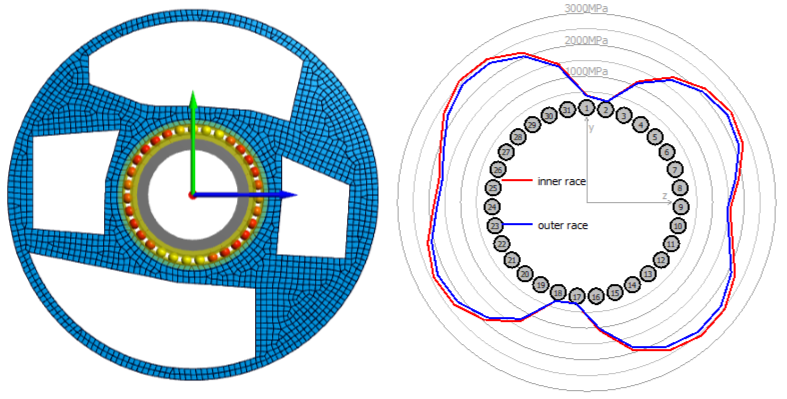Version 07/2019 of MESYS Shaft and Bearing analysis software is now available under Downloads.
General Extensions
The parameter variation now allows an additional optimization step. For example, the maximum permissible radial force can be calculated for each case dependent on different criteria.

Permissible radial force for different speed and axial forces based on several conditions.
Data points of diagrams can now by exported in XLSX format. The curves can also be copied from one diagram into another, this can be used for comparison of results.
Some additional methods were added to the COM interface. For example, a method to retrieve the stiffness matrix of bearings and ball screws.
Extensions in the Bearing Calculation
The bearing databases from Schaeffler and SKF are updated to latest data from the manufacturers. These only contain catalog data. The internal geometry is approximated by the software.
A new database from HQW Precision GmbH is added containing spindle bearings up to 30 bore diameter. This database contains internal geometry provided by HQW and the internal geometry is hidden. Further databases with internal geometry are available from GMN, IBC and CSC on request from the manufacturer.
Three-point bearings were added as bearing type. They have one full radius on one race and two radii like in four-point bearings on the other race. The load capacity is calculated based on angular contact bearings using the free contact angle.
An additional option for roller profiles was added allowing the input of two tangential radii.
Gyroscopic moments can now be considered on all ball bearing types including four-point bearings, where it was not supported before.
Extensions in the Shaft Calculation
A background drawing can by added by pasting it from the clipboard. Then the shaft geometry can be drawn as a polygon. This can be used if shaft geometry was just provided as a PDF. The CAD import as DXF or STEP now also allows a rotation of the drawing in case the shaft axis is not the x-axis.

Import of background graphic and geometry input as polygon
Harmonic reponse can now be calculated on periodic displacements in addition to periodic forces. Excitations can be defined for supports connected to the rigid environment. They can also be defined for bearings based on inner or outer ring rotation or for gear mesh frequencies of cylindrical gears.
For planetary gear stages now the results are reported for supports of all planets and also the results for all gear pairs are provided. They were calculated before but not available in the standard report or result overview. The results for different planets can be different in case additional forces are applied to planet carrier or the rings gear.
For 3D-elastic parts with elastic bearings, now contact between bearing ring and part can be considered. The fitting is then considered in the contact model instead in the operating clearance of the bearing.

Pressure distribution in a wheel bearing after mounting without external loads. Fitting is considered in contact model.
It is now possible to consider centrifugal expansion on 3D-elastic parts.
Additional new features for 3D-elastic parts are new possibilities for mesh import and mesh export. Also new faces for connection with supports can now be defined directly within the software.


